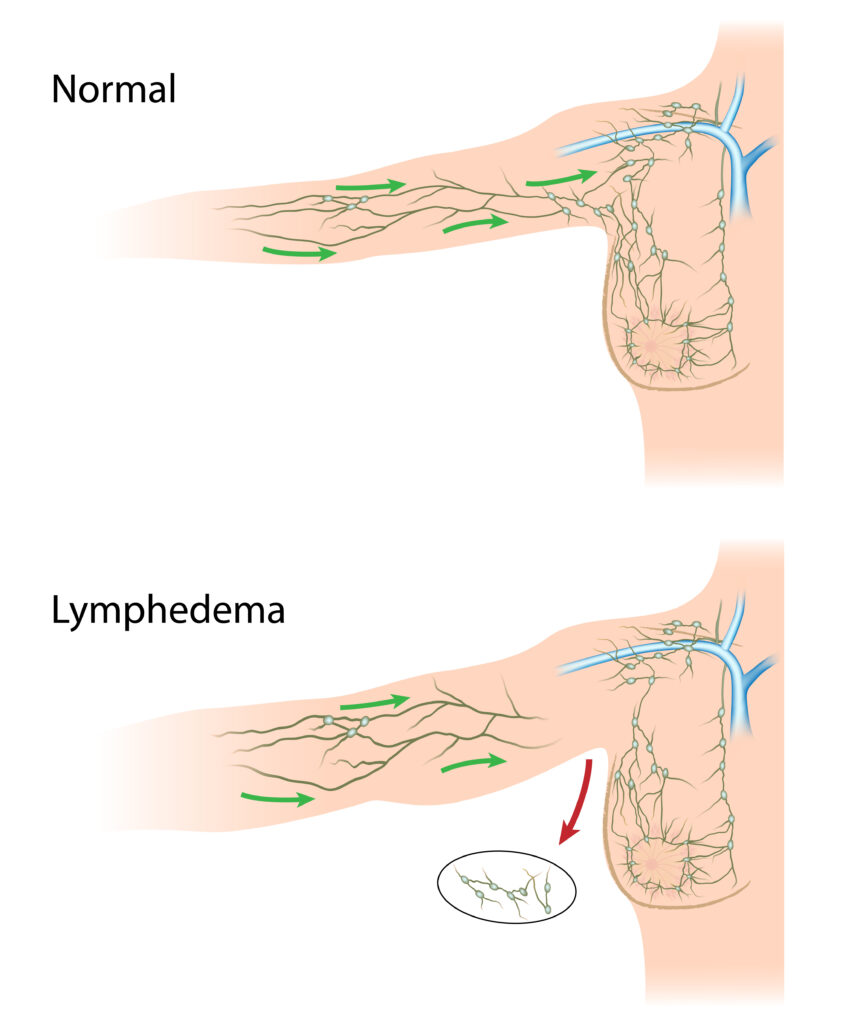Lymphedema Awareness Month – Part 1
March is a time dedicated to raising awareness about lymphedema, a condition that affects millions worldwide. Among the various forms of lymphedema, breast cancer-related arm lymphedema (BCRAL) stands out as a significant concern, impacting up to 20% of breast cancer survivors. As we mark Lymphedema Awareness Month, it’s crucial to shine a light on BCRAL and the urgent need for education and prevention strategies.
Lymphedema occurs when the natural flow of lymphatic drainage is disrupted, leading to the accumulation of protein-rich fluid in the affected limb. For breast cancer survivors, particularly those who underwent surgery or radiation therapy involving lymph nodes, the risk of developing BCRAL is heightened. Despite its prevalence and impact on patients’ quality of life, awareness about BCRAL remains surprisingly low.

Breast Cancer-Related Arm Lymphedema
In a study published in the journal Gland Surgery, researchers highlighted the profound implications of BCRAL on patients’ well-being. The condition often leads to physical discomfort, functional limitations, and psychological distress, significantly reducing the overall quality of life for survivors. Unfortunately, many cancer survivors are unaware of the risk factors associated with lymphedema, with studies showing that 60% to 80% of them lack essential knowledge about prevention and management.
Dr. David Weintritt, who is part of a dedicated Breast Cancer Team at Virginia Cancer Specialists, emphasizes the importance of raising awareness and educating breast cancer patients about BCRAL. “I am vigilant in bringing awareness and education to my breast cancer patients – from diagnosis through survivorship,” says Dr. Weintritt. “By providing actionable advice and strategies, we can empower patients to manage their health journeys effectively and prevent a disease that is reversible if caught early on.”
One of the critical aspects of addressing BCRAL is improving patient access to comprehensive programs aimed at prevention and management. These programs incorporate education about lymphedema risk factors, early detection strategies, and recommended interventions to mitigate its impact. “We’ve been aware of the risk of lymphedema yet for too long have not provided a dedicated multidisciplinary approach to prevention, diagnosis, and treatment,” says Dr. Weintritt. “One of the most important changes in my practice over the last five years has been creating a two step approach to not only detect BCRAL at a stage where it’s easier to treat, but also developing and implementing surgical techniques that can prevent lymphedema even in patients who are the highest risk.”
The first step is Bioimpedance spectroscopy (BIS). BIS has emerged as a groundbreaking tool in the fight against BCRAL. This low-cost, FDA-cleared technology accurately measures a patient’s total body water, extracellular, and intracellular fluid volumes in a clinical setting. Before the development of BIS, the stages of BCRAL were determined using an old-school tape measure. BIS works by sending a small electrical current through electrodes on the skin and measuring the resulting voltage.
Early detection of BCRAL is critical because stages 0 and 1 of arm lymphedema are reversible, whereas stages 2 and 3 are not. National clinical guidelines emphasize the importance of early lymphedema detection and recommend using BIS as part of regular screening. The largest randomized clinical trial to assess BCRAL showed that 92% of patients did not progress to chronic lymphedema through screening and intervention protocols (including BIS) compared to other patients screened using a tape measure.
As we observe Lymphedema Awareness Month, let us renew our commitment to raising awareness about BCRAL and supporting initiatives that promote education and early intervention. Stay tuned for part 2 of Lymphedema Awareness Month – Turning Awareness Into Action where Dr. Weintritt describes new surgical techniques he provides that can prevent lymphedema even in patients with the highest risk. By empowering breast cancer survivors with knowledge and access to effective strategies, we can help them minimize the risk of developing lymphedema and improve their overall quality of life.
Facts BCRAL and BIS (Breast Imaging System):
-
- BCRAL affects up to 20% of breast cancer survivors.
- Lymphedema occurs when the natural flow of lymphatic drainage is disrupted, leading to fluid buildup in the affected limb.
- Lack of awareness about BCRAL is prevalent among cancer survivors, with 60% to 80% being unaware of the risk factors.
- Comprehensive programs that incorporate education, early detection, and intervention strategies are essential for managing BCRAL effectively.
- Bioimpedance spectroscopy (BIS) is a low-cost, FDA-cleared technology that accurately measures a patient’s total body water, extracellular, and intracellular fluid volumes in a clinical setting.
- Before BIS, the stages of BCRAL were determined using an old-school tape measure.
- BIS works by sending a small electrical current through electrodes on the skin and measuring the resulting voltage.
- Early detection of BCRAL is critical because stages 0 and 1 of arm lymphedema are reversible, whereas stages 2 and 3 are not.
- National clinical guidelines recommend using BIS as part of regular screening for early lymphedema detection.
The largest randomized clinical trial to assess BCRAL showed that 92% of patients did not progress to chronic lymphedema through screening and intervention protocols (including BIS) compared to other patients screened using a tape measure.
Virginia Cancer Specialists offers a comprehensive range of breast surgery services, from diagnosis to treatment, including surgery for breast cancer and benign conditions, screening, radiation and medical oncology, genetic testing, and counseling. Our integrated approach ensures patients receive cutting-edge care tailored to their needs.
Our surgeons collaborate closely with dedicated breast cancer medical and radiation oncologists within the community, providing personalized, multidisciplinary care. As we raise awareness about BCRAL during Lymphedema Awareness Month, Virginia Cancer Specialists remains committed to empowering breast cancer survivors and those at risk through compassionate, comprehensive care.








